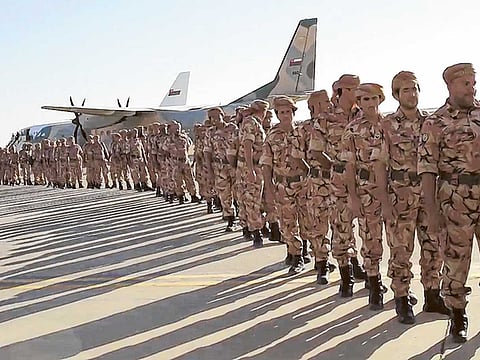Military drills in Saudi Arabia send strong message
The operation is meant to show joint forces are more than a match for any terrorist threat

Dubai: As armed forces from more than 20 countries gather in northern in Saudi Arabia for the largest military drills staged in decades, analysts say the exercise offers an opportunity for Arab forces to show their readiness and unity in the event of any potential security threat or deployment.
And while Operation Northern Thunder is clearly meant to show that the joint forces are more than a match for any terrorist threat, the exercises could be potentially signalling that the forces in a state of operational readiness should more be required.
“The timing of the manoeuvres has a great significance,” said Jamal Mazloum, a military expert and former director of the strategic studies centre of the Egyptian forces.
“It shows support to the Saudi kingdom and its policies in general,” he said. “There is a big Arabic and Islamic group gathering in northern kingdom and it is ready to defend Saudi Arabia and support it in the face of terrorism.”
The military exercises also send a clear message to Iran to stop interfering in Arab internal affairs, Mazloum said.
Official Saudi media described the manoeuvres as the most important ever staged in the region, and the “largest in the region’s history” in terms of the number of nations taking part and the weaponry being used.
But the Saudi media didn’t specify when the military exercise will begin or how long it will last.
Among the nations taking part are Saudi Arabia’s five partners in the Gulf Cooperation Council, as well as Chad, Egypt, Jordan, Malaysia, Morocco, Pakistan, Senegal and Tunisia.
“These exercises will revive the military spirit and create a good nationalistic spirit among everybody,” said former Kuwaiti minister of information Mohammad Nasser Al Sanousi. “It is a beginning of an agreement on many issues,” he told Gulf News. But he dismissed that the drills are targeting Iran.
“I am among the optimistic people of the future between the members of the Arab Gulf Cooperation Council and Iran,” he said. “ I am optimistic that the future will have better circumstances and cooperation.”
Qatari political scientist Mohammad Saleh Al Mesfir expressed a similar view, and ruled out that the military exercises are targeting Iran — or indeed Russia — which is fighting in Syria to support President Bashar Al Assad’s regime.
“The manoeuvres have two facets,” Al Mesfir said. “The first facet is a group of countries who follow the western school of fighting are holding a military exercise, and that there were similar exercises held previously in Jordan and Egypt,” he told Gulf News.
“The second facet is that there is an Islamic force gathered in the current situation to reaffirm the call to form an Islamic military force to fight terrorism across the Islamic countries.”
News of the military exercises coincided with an announcement by Saudi Arabia, which is a member of the US-led coalition targeting, that it has deployed warplanes to a Turkish airbase in order to “intensify” its operations against Daesh in Syria.
“To be honest with you, I don’t know and I don’t get it,” said Waheed Hamza Hashem, a Saudi political scientist based in Jeddah, in reference to the drills.
“Is it only against Daesh in Syria? What about Daesh in Iraq? If they (coalition troops) entered Syria and were hit by Russian aeroplanes, what would happen? Or if a Russian plane was downed, what will happen?”
Already Iran, a staunch supporter of Al Assad regime, has warned Saudi Arabia against any intervention in Syria.
“What will Iran do? Send troops to Syria or attack the American interests in the Gulf?” Hashem noted.
Sign up for the Daily Briefing
Get the latest news and updates straight to your inbox



